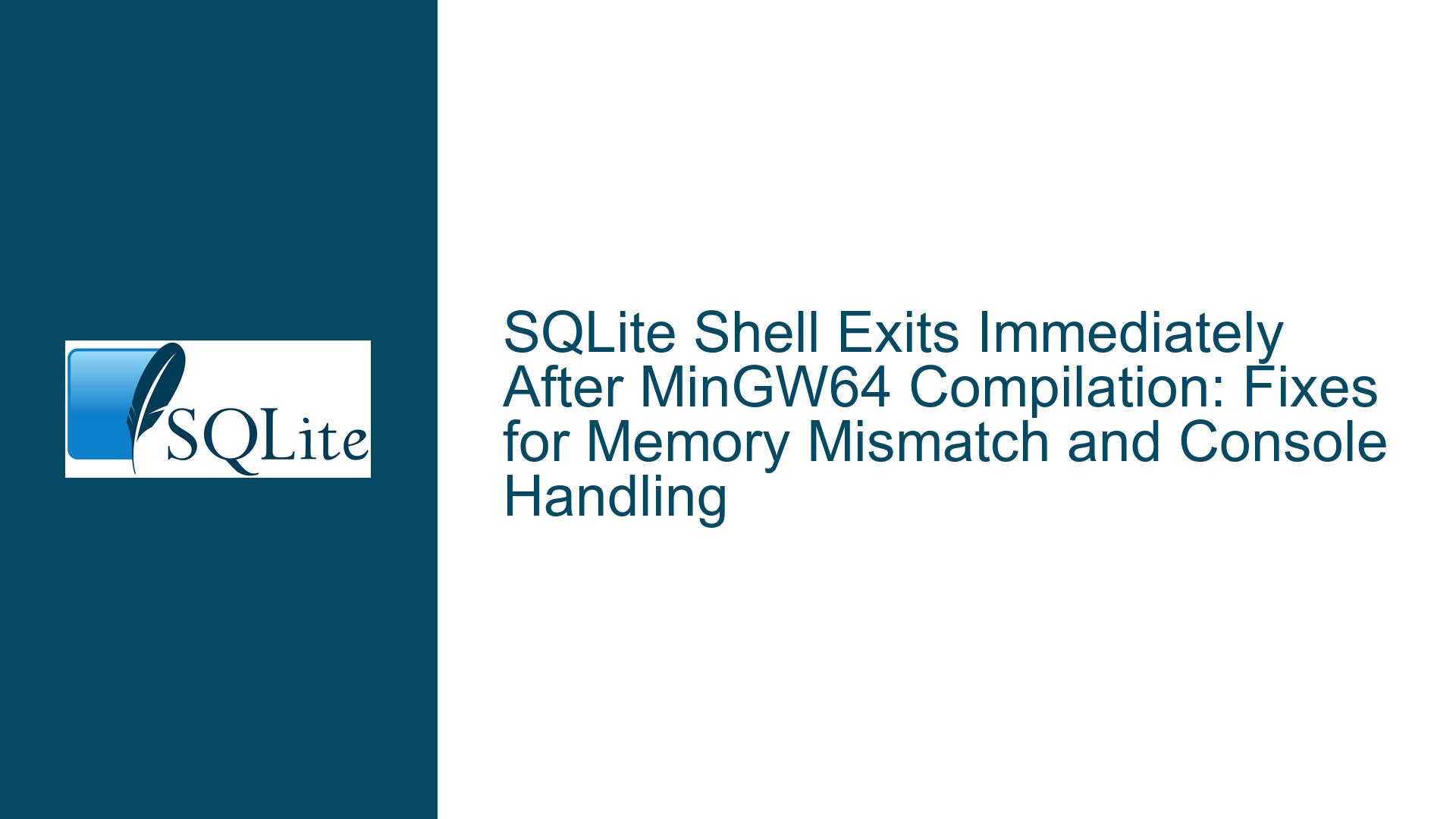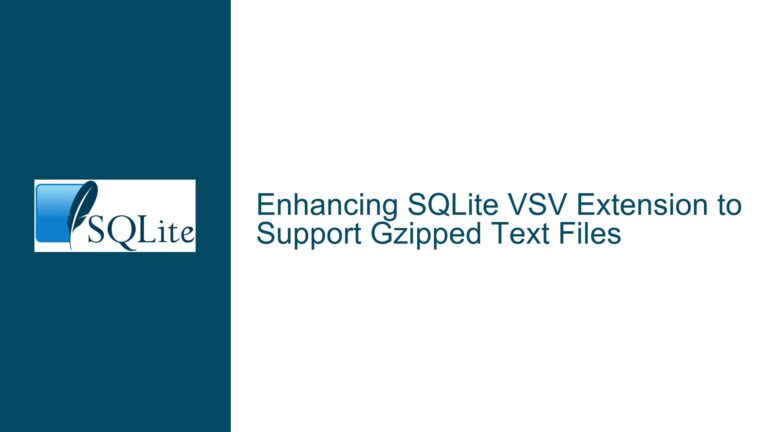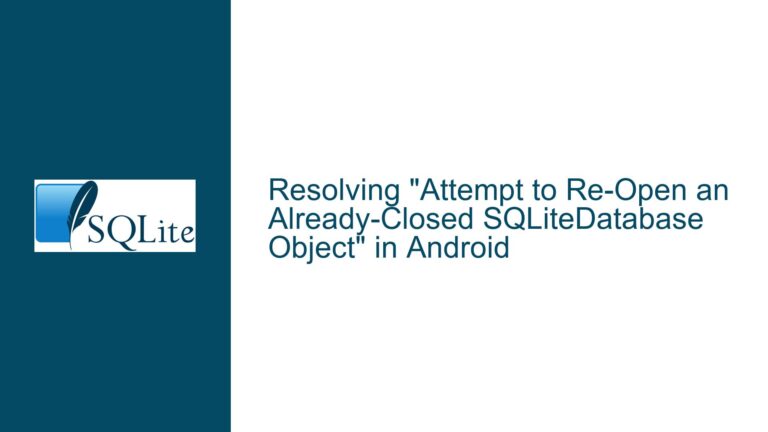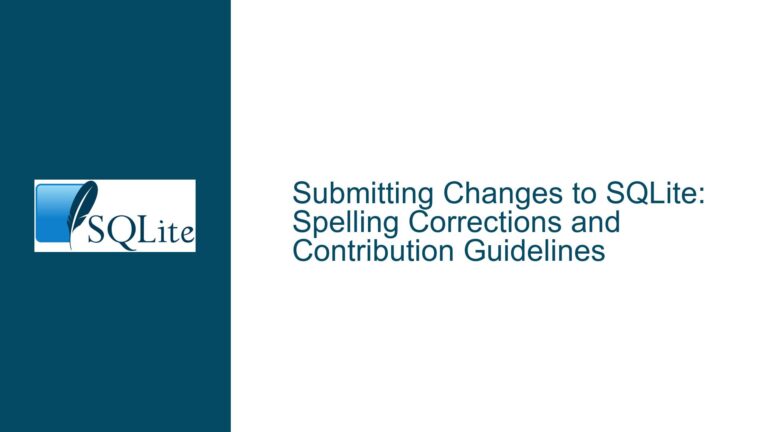SQLite Shell Exits Immediately After MinGW64 Compilation: Fixes for Memory Mismatch and Console Handling
Issue Overview: SQLite Shell Terminates Prematurely When Compiled with MinGW64
The SQLite command-line shell (CLI) compiled using MinGW64 exhibits immediate termination after displaying version and help information. This occurs specifically when building version 3.47.0 or later from source using the gcc compiler on Windows platforms. The shell starts but exits without providing an interactive prompt, rendering it unusable for database operations. Key symptoms include:
Abnormal Exit Sequence:
After compilation, executingsqlite3.exedisplays the version banner ("SQLite version 3.47.0…") and ".help" prompt but closes before accepting user input. This differs from normal behavior where the shell awaits commands indefinitely.Environment-Specific Failure:
The issue manifests exclusively in MinGW64-compiled binaries. Precompiled Windows binaries from SQLite.org function correctly, indicating platform-specific interactions between SQLite’s I/O layer and MinGW’s runtime libraries.Character Encoding and Memory Management Interactions:
The problem correlates with two technical changes introduced in SQLite 3.47.0:- Unicode Console Handling: Enhanced support for UTF-8 input/output via
sqlite3_fgets()andsqlite3_fputs(), which interact with Windows console modes (_setmode()). - Memory Allocator Mismatch: Dynamic memory allocated via
malloc()but deallocated viasqlite3_free(), violating allocator-deallocator pairing rules.
- Unicode Console Handling: Enhanced support for UTF-8 input/output via
Workaround-Dependent Stability:
Applying patches that replacesqlite3_free()withfree()in I/O functions or disabling Unicode console handling temporarily resolves the issue but introduces tradeoffs in character encoding support.
Root Causes and Contributing Factors
1. Allocator-Deallocator Mismatch in I/O Functions
SQLite 3.47.0 introduced sqlite3_fgets() and sqlite3_fputs() (from ext/misc/sqlite3_stdio.c) to handle UTF-8 text in Windows consoles. These functions erroneously mixed memory management APIs:
wchar_t *b1 = malloc(...); // Allocated with standard malloc()
// ...
sqlite3_free(b1); // Freed with SQLite's allocator
Consequences:
- On platforms where
malloc()/free()andsqlite3_malloc()/sqlite3_free()use separate heaps (e.g., MinGW), this mismatch causes heap corruption or null pointer dereferencing. - The SQLite shell terminates abruptly due to unhandled exceptions in memory management.
Why MinGW Is Affected:
MinGW’s runtime library (msvcrt.dll) implements a distinct memory heap from SQLite’s internal allocator. Mixing allocators across heaps leads to undefined behavior, whereas Microsoft’s Visual C++ compiler might tolerate such mismatches due to heap structure similarities.
2. Console Mode Configuration Conflicts
The sqlite3_fgets()/sqlite3_fputs() functions configure console modes via _setmode(_fileno(stdin/stdout), _O_U8TEXT) to enable Unicode I/O. MinGW’s implementation of these functions interacts differently with Windows APIs compared to native MSVC builds:
_setmode()Limitations in MinGW:
MinGW’s_setmode()may fail to properly switch console modes when combined with wide-character I/O functions likefgetws()/fputws(), causing input/output pipelines to close prematurely.- Redirection Handling:
When stdin/stdout is redirected (e.g., pipes or files),_setmode()behavior diverges between MSVC and MinGW environments, leading to incomplete encoding transitions.
3. Thread-Local Storage (TLS) Initialization in MinGW
MinGW’s GCC compiler requires explicit linkage to Windows’ Unicode entry point for console applications:
#ifdef __MINGW32__
int wmain(int argc, wchar_t **argv) { ... }
#endif
SQLite’s shell uses main() instead of wmain(), causing incomplete Unicode argument parsing and potential crashes during startup initialization. Compiling without -municode linkage exacerbates this issue.
4. Legacy Windows Version Incompatibilities
Testing revealed sporadic character rendering issues (e.g., squares replacing valid Unicode characters) on Windows 7 when using cmd.exe or Far Manager. This stems from:
- Outdated console host (
conhost.exe) versions lacking full UTF-8 support. - Differences in
ReadConsoleW()/WriteConsoleW()behavior between Windows 7 and 10/11.
Resolution Steps and Workarounds
1. Apply Official SQLite Patches for Allocator Consistency
The SQLite development team addressed the allocator mismatch in trunk and backported it to the 3.47 branch. To integrate this fix:
Step 1: Update Source Code
Obtain the latest source from:
- Trunk: sqlite-trunk.tar.gz
- Branch 3.47: branch-3.47
Step 2: Verify Code Changes
Ensure sqlite3_stdio.c (embedded in shell.c) uses consistent allocators:
// Before (incorrect):
wchar_t *b1 = malloc(sz * sizeof(wchar_t));
sqlite3_free(b1);
// After (correct):
wchar_t *b1 = sqlite3_malloc(sz * sizeof(wchar_t));
sqlite3_free(b1);
Step 3: Recompile with MinGW64
Use this command to include Unicode entry point linkage:
gcc -DSQLITE_U8TEXT_ONLY -municode shell.c sqlite3.c -o sqlite3.exe
-municode: Links againstwmain()for proper Unicode argument handling.-DSQLITE_U8TEXT_ONLY: Simplifies console I/O by assuming UTF-8 without runtime mode changes (optional).
2. Manual Patching for MinGW-Specific Console Handling
If updating SQLite sources isn’t feasible, apply this patch to shell.c for MinGW compatibility:
Patch for sqlite3_fgets():
@@ -462,13 +462,25 @@
wchar_t *b1 = malloc(sz * sizeof(wchar_t));
if (b1 == 0) return 0;
+#ifdef __MINGW32__
+ if (IsConsole(in)) {
+ DWORD NumberOfCharsRead;
+ ReadConsoleW(GetStdHandle(STD_INPUT_HANDLE), b1, sz, &NumberOfCharsRead, NULL);
+ b1[NumberOfCharsRead] = 0;
+ } else {
+ _setmode(_fileno(in), _O_U8TEXT);
+#else
_setmode(_fileno(in), IsConsole(in) ? _O_WTEXT : _O_U8TEXT);
+#endif
if (fgetws(b1, sz/4, in) == 0) {
- sqlite3_free(b1);
+ free(b1);
return 0;
}
+#ifdef __MINGW32__
+ }
+#endif
WideCharToMultiByte(CP_UTF8, 0, b1, -1, buf, sz, 0, 0);
- sqlite3_free(b1);
+ free(b1);
return buf;
} else {
Key Modifications:
- Directly invokes
ReadConsoleW()/WriteConsoleW()for MinGW consoles, bypassing unreliable_setmode()calls. - Replaces
sqlite3_free()withfree()wheremalloc()was used (interim fix until official patches are applied).
3. Compiler Flag Optimization
MinGW64 requires specific flags to align memory alignment and stack characteristics with SQLite’s expectations:
gcc -O2 -DSQLITE_U8TEXT_ONLY -municode -mconsole -march=x86-64 -mtune=generic \
-D_WIN32_WINNT=0x0600 shell.c sqlite3.c -o sqlite3.exe
-D_WIN32_WINNT=0x0600: Targets Windows Vista/Server 2008 APIs, ensuring consistentReadConsoleW()behavior.-mconsole: Ensures correct subsystem linkage for console applications.
4. Testing and Validation Procedures
After recompiling, validate the shell using:
Test 1: Interactive Input
./sqlite3.exe
SELECT 'Hello, 世界'; -- Enter UTF-8 text directly
Expected Result: The shell displays Hello, 世界 without exiting.
Test 2: Input/Output Redirection
echo "SELECT hex(randomblob(16));" | ./sqlite3.exe
Expected Result: A 32-character hexadecimal string is printed.
Test 3: Unicode File Handling
Create test.sql with UTF-8 content (e.g., SELECT 'äöüÄÖÜß';) and execute:
./sqlite3.exe < test.sql
Expected Result: The output matches the Unicode string without substitution characters.
5. Mitigations for Legacy Windows Versions
For Windows 7 compatibility:
Option 1: Use Alternative Terminals
Replace cmd.exe with terminals having better Unicode support:
- MSYS2
- ConEmu
- Windows Terminal (requires third-party backports)
Option 2: Disable Unicode Input Modes
Compile with -DSQLITE_U8TEXT_ONLY to bypass _setmode():
gcc -DSQLITE_U8TEXT_ONLY -municode shell.c sqlite3.c -o sqlite3.exe
Tradeoff: Non-UTF8 characters may display incorrectly, but the shell remains stable.
6. Long-Term Maintenance Strategy
To avoid regression during future SQLite upgrades:
- Monitor Amalgamation Updates: Regularly check SQLite’s changelog for I/O and MinGW-related fixes.
- Integrate CI/CD Checks: Add MinGW compilation and interactive shell tests to automated build pipelines.
- Use SQLite’s Custom Allocator: Modify
sqlite3_fopen()/sqlite3_popen()inshell.cto usesqlite3_malloc()/sqlite3_free()consistently.
By methodically addressing allocator mismatches, MinGW console quirks, and legacy Windows limitations, developers can stabilize SQLite shell compilations while preserving full Unicode functionality.






